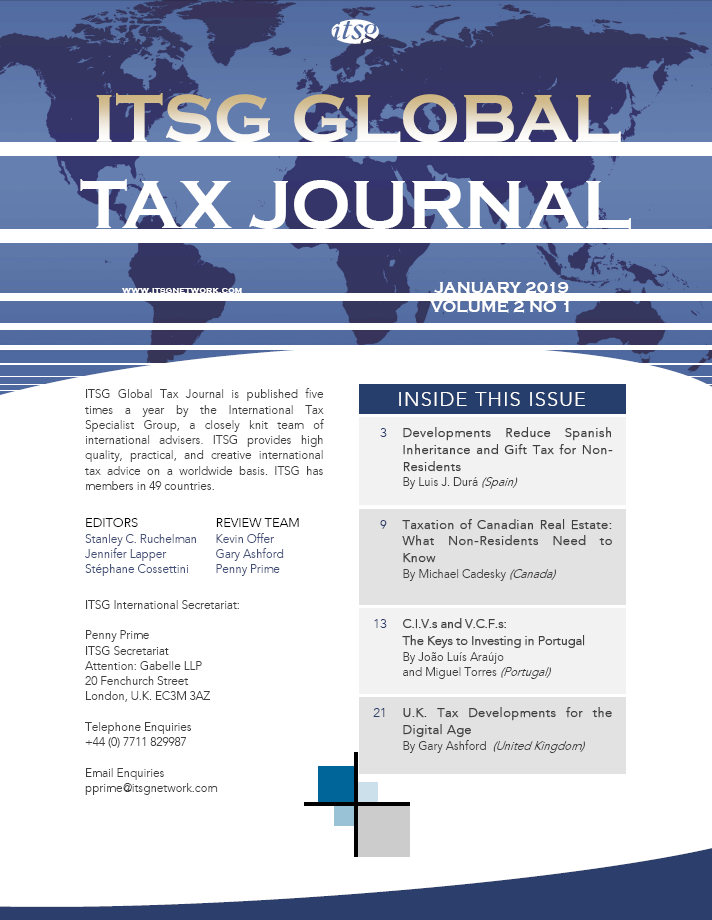Introduction
In recent years, Portugal has been best known for its national football team, its sun, and its good food. Whilst these basic ideas about Portugal still apply, the country has become more talked about in the context of international investment after a number of tax and legislative reforms were first introduced in 2012 – and, especially, from 2014 onwards. Portugal now has a favourable tax regime for individuals seeking to relocate to Portugal called the non-habitual resident (N.H.R.) regime, a Golden Visa regime available to investors seeking to invest in Portugal and receive a residency visa, and a visa-free travel regime for the Schengen Area. Also, from a corporate perspective, Portugal offers access to a number of structures, which are very tax efficient and compete with similar tax regimes found in other European countries.
This article will start by describing the general characteristics of the Portuguese corporate tax regime and will then focus on why Portugal is an efficient location to set up structures from which to make international investments or investments into Portugal. We will focus on describing the main features of the Portuguese tax regime as applicable to holding company structures and special regulated vehicles, such as real estate investment funds and companies, financial assets investment funds and companies, and venture capital funds (V.C.F.s).
Main characteristics of the Portuguese corporate tax regime
Portugal has a typical corporate tax regime with corporation tax being levied at 21%, plus an additional municipal rate of up to 1.5%. Additionally, for companies with taxable profits greater than €1.5 million, an additional state corporate tax rate applies, starting at 3% and increasing to 7% for taxable profits over €35 million.
The set-up, administration, and liquidation of a Portuguese company is quite a simple process. Portugal is also considered an easy place to do business, ranking 34th on the World Bank’s 2018 Ease of Doing Business Index. Importantly, whilst Portuguese-based banks apply all the same compliance and strict anti-money laundering practices as other European countries, recent experience shows that it is easier to open a bank account in Portugal than in a number of other European locations. This means that what is currently a significant constraint for companies to operate in certain locations should not be so much of an issue in Portugal, at least for the time being.
Portugal is an E.U. Member State and is, therefore, able to access the benefits granted by all relevant E.U. directives. Additionally, more than 75 double tax treaties (D.T.T.s) have been signed by Portugal with countries all over the world. Portuguese-based corporations, therefore, have access to a wide and relatively modern treaty network. The recently-signed D.T.T. with Angola stands out in this context since Portugal is now the first country with which Angola has a D.T.T. The same holds true for Brazil, with which Portugal has had a longstanding treaty in place and which does not have many other treaties.
Another point worth mentioning is that it is possible to resolve tax disputes very quickly by using the tax arbitration courts, a topic which would merit a separate article and where Portugal has really introduced an innovative concept. The regular tax courts in Portugal are notoriously slow and decisions may take years to be reached. This, coupled with the fact that taxpayers typically need to pay the amount of tax being challenged before contesting its legality in the courts, means that taxpayers rightly consider that going to court to ascertain their rights is a time consuming and typically expensive process. Understanding these concerns, the legislator introduced, in 2011, tax arbitration courts in which disputes are settled in a maximum timeframe of one year, or often less. This innovative approach to the arbitration courts allows the taxpayer to choose whether or not to use this route to settle disputes, and the tax authorities have to accept the choice made by the taxpayer. Tax arbitration courts have been a highly successful experiment and the way they were implemented in Portugal is actively being analysed by many other countries around the world.
In terms of anti-avoidance legislation, Portugal introduced, many years ago, controlled foreign company (C.F.C.) legislation, general anti-abuse provisions, and an interest deduction limitation rule.
Having provided a very high-level introduction to Portugal, we will now look at some of the specific measures and investment vehicles currently in place that make Portugal an interesting location from which to structure domestic or international investments.
The Portuguese participation exemption regime
As is widely known, Portugal suffered a very severe financial crisis beginning in 2009. The worst years were in the 2011-2014 period, when Portugal was under a severe austerity program supervised by the International Monetary Fund, the European Central Bank, and the European Commission. However, from every crisis comes opportunity. Nowhere is this more apparent than in Portugal. The times of the financial crisis were seen by the Portuguese government as an opportunity to push through economic and legislative reforms, which could have been more difficult to introduce under other circumstances.
These legislative changes were not only tax-related. Tax reforms coincided with labour market reforms, the liberalisation of the rental market, and actions in a number of other areas of the economy aimed at making Portugal a more attractive place in which to invest.
Two key measures in this package of reforms were the introduction of the participation exemption regime and changes to the taxation of dividend distributions to foreign shareholders. When taken together, these changes make Portugal a favourable country from which to set up holding company structures and carry out international investments.
The Portuguese participation exemption regime was designed taking into consideration the tax regimes of many other European countries. The specific purpose was to increase the competitiveness of the domestic tax regime. As such, it will not be a surprise to see many features in Portuguese tax regimes that we encounter elsewhere in Europe.
For Portuguese companies with qualifying shareholdings, there will be:
- No tax on dividends received from qualifying shareholdings,
- No tax on capital gains received from qualifying shareholdings, and
- No withholding tax (W.H.T.) on dividends paid (so long as the distribution is made to a company that meets all the necessary criteria).
Dividends received or capital gains arising from a qualifying shareholding will be exempt from tax in Portugal if:
- The company receiving the income or realizing the capital gain holds no less than 10% of the shares or voting rights in the company making the distribution or being sold; and
- This shareholding is maintained for a period longer than 12 months.
The Portuguese participation exemption includes a number of anti-abuse provisions which are aimed at ensuring that the exemption on dividend income or capital gains on the disposal of shares only applies where the underlying company is subject to a level of tax that is considered to be at an appropriate tax rate. In particular, for the participation exemption to apply:
- The company that makes the distribution or is being sold must be resident in a jurisdiction that is not a tax haven1;
- The company that makes the distribution or is being sold must be subject to tax in its country of residence at a rate which cannot be less than 60% of the Portuguese tax rate (i.e., cannot be less than 12.5%); and
- Even if the company making the distribution or being sold is resident in a tax haven, the participation exemption will still apply if it carries out a real trade in that country.
Provided that the above-mentioned conditions are met, the disposal of shares of qualifying companies and the receipt of dividends from such shares will be fully exempt from tax in Portugal.
Furthermore, dividends paid by a Portuguese-resident company are exempt from Portuguese W.H.T. as long as they are paid to:
- A company that is resident for tax purposes in another E.U. Member State (this is due to the application of the Parent-Subsidiary Directive) or in a country in the European Economic Area (E.E.A.), or
- A company that is resident for tax purposes in a country with which Portugal has signed a D.T.T.
The above exemption from Portuguese W.H.T. applies where the company to which the dividend is paid:
- Is subject to, and not exempt from, tax at a rate which is at least 60% of the Portuguese tax rate, and
- Holds more than 10% of the Portuguese company and held these shares for an uninterrupted period of one year prior to the distribution.
This exemption to tax on the dividends paid from Portugal does not apply where the recipient of the dividend is not a company but an individual. In this case, a 28% W.H.T. rate will apply. This rate will be reduced should the individual recipient of the dividend be resident for tax purposes in a country with which Portugal has a D.T.T. providing for such a reduction.
As can be seen, the Portuguese participation exemption regime is extremely competitive when compared to other European countries such as Luxembourg or the Netherlands, which have, for a long time now, been used as the location of choice for the creation of international holding structures.
Furthermore, in a world where substance is ever more important, especially once the multilateral instrument (M.L.I.) and other O.E.C.D. B.E.P.S. measures are implemented across multiple jurisdictions, it is worth noting that the costs of incorporating and maintaining structures in Portugal are much lower than in other European destinations. This also goes for the hiring of office space or employees, since labour and the general cost of doing business are significantly lower in Portugal than in other European locations. As such, creating substance in Portugal should be much cheaper than in other European jurisdictions. This fact has not gone unnoticed by companies from all over the world, who are currently busy moving their businesses to Portugal.
Portuguese regulated vehicles – funds and companies
A brief introduction to the legal regime
Portuguese collective investment vehicles (C.I.V.s) were regulated by legislation enacted in March 2015. The legislation that introduced the new legal regime was closely followed by a new tax regime, also introduced in 2015, which set out the tax rules applicable to such entities.
From a legal perspective, C.I.V.s can be defined as institutions, with or without legal personality, which are aimed at the collective investment of capital obtained from investors, whose operation is subject to the pursuit of the participants' exclusive interest.
Under Article 5(1) of the C.I.V. legislation, these entities may take the form of a contractual relationship, created as an investment fund, or may be incorporated in a corporate form – in this case, investment companies in the form of sociétés anonymes (SAs) or public companies.
Where C.I.V.s are created in the form of funds, they constitute autonomous assets, without legal personality, belonging to the participants in the special communion regime. The main characteristic of these entities is that they offer the collective investment of capital with the benefits that come from economies of scale and professional management with a dispersion of risks and a dilution of costs.
Investment companies are incorporated in the form of an SA or public company and have all the main characteristics that would be expected of a corporate entity: distinct legal personality, ability to enter into contracts, limited responsibility, statutory bodies, etc.
Collective investment funds must be managed by a third-party management company which is regulated in Portugal or in another E.U. country. Collective investment companies may be managed by a third-party management company or may be self-managed. A self-managed investment company will face closer scrutiny from the regulatory authorities since it must demonstrate that it has the necessary internal to manage all the compliance and regulatory requirements that are imposed by the authorities.
C.I.V.s can be open- or closed-ended vehicles regulated by the financial authorities, the Comissão de Mercado e Valores Mobiliários (C.M.V.M.). They are A.I.F.M.D.-ready (referring to the E.U. Alternative Investment Fund Managers Directive), which means that they can access the European investment passport, assuming all conditions are met.
It should be noted that these C.I.V.s must receive approval for incorporation from the C.M.V.M., as well as the Portuguese Central Bank. The process of approving such vehicles takes around 90 days, and our recent experience in dealing with the authorities in such projects has been quite positive.
Apart from the traditional distinctions between open-ended and closed funds, capitalisation, or income distributing, Portuguese C.I.V.s are distinguished mainly by the types of assets in which they can invest. The distinction between real estate vehicles and financial investment entities is very important. On one hand, the objective of the latter is to manage assets composed of highly-liquid securities, financial instruments admitted to trading or on a regulated market, and overnight deposits. On the other hand, real estate vehicles can only invest in real estate assets or in securities of companies with the objective of mediating, transacting, developing, or exploiting real estate.
The tax regime applicable to C.I.V.s
C.I.V.s are, in principle, subject to tax in Portugal. However, they are exempt from tax on all categories of income typically received, since the applicable legislation provides that the following items of income will not be taken into consideration when calculating taxable income:
- Capital income,
- Property income, and
- Capital gains.
These sources of income are excluded from the tax base in all cases, except where such income is derived from entities which are resident or domiciled in a country, territory, or region where it is clear there is a more favourable tax regime. (See, for example, the above-mentioned tax haven list.)
Like other corporate taxpayers, C.I.V.s must submit a periodic declaration of income and also comply with self-assessment of the tax due by the last day of May.
As a result of the above, whilst C.I.V.s are subject to corporate tax, they will actually pay little or no corporate tax at the entity level, unless they have items of income that do not fall under the categories excluded from tax. In practice, this is unlikely to happen. However, this does not mean that C.I.V.s are not subject to any taxation in Portugal, since the net asset value (N.A.V.) of the C.I.V.s will be subject to Portuguese Stamp Duty on a quarterly basis.
The N.A.V. of the C.I.V. is determined on the basis of the average values reported to the C.M.V.M. or disclosed by the management entities. The following stamp duty rates will apply per quarter:
- 0.0025% per quarter (i.e., 0.01% a year) for C.I.V.s investing exclusively in financial instruments and deposits, and
- 0.0125% per quarter (i.e., 0.05% a year) for other C.I.V.s, such as real estate investment entities.
Settlement of Stamp Duty must be made by the last day of the month subsequent to the constitution of the tax obligation, which is established on the last day of March, June, September, and December of each year.
This means that, at the entity level, no taxation is expected to apply to C.I.V.s, apart from the stamp duty costs. Portugal has, as such, implemented the exit approach to tax on these entities. This means that it seeks to apply only one level of tax and to apply it at the level of the individual unitholders or shareholders in these vehicles. The tax rate at the investor level will depend on whether the investor is resident in Portugal and whether the vehicle invests in real estate or in financial assets.
For foreign investors in Portuguese investment vehicles, the applicable W.H.T. rates are:
- 10% on real estate investment vehicles, and
- 0% in relation to all other income.
Capital gains made by foreign investors on the disposal or redemption of shares or units in C.I.V.s investing in financial assets will not be subject to tax in Portugal. However, capital gains made by foreign investors on the disposal or redemption of shares or units in real estate C.I.V.s may be taxable in Portugal.
For Portuguese investors in Portuguese C.I.V.s, the tax applicable is typically a flat rate of 28%, the rate that is generally applicable to capital and rental income. The same rate will apply to gains arising on the disposal or redemption of such assets.
An added advantage of a Portuguese C.I.V. is that it is able to access tax treaties, as (from a Portuguese perspective) it is considered to be a local taxpayer and subject to tax. Certain countries may not consider these vehicles to be funds with access to the treaties, since they are not a body corporate. Where this proves to be an issue, it may be advisable to incorporate as a collective investment company rather than a collective investment fund to avoid such limitations.
Our law firm has recently been working on projects relating to the conversion of existing non-regulated real estate entities with very significant real estate assets into regulated investment companies. This is a time-consuming and complex project, but subject to all necessary conditions being met, it should be possible to convert a non-regulated entity into a regulated investment company without triggering any adverse tax consequences. Once the entity has been converted and is fully authorised by all relevant authorities, the above-described tax regime will be available. This may represent a substantial tax saving, since corporate tax may no longer be levied on the capital gains realised on the disposal of the properties or on the income generated by the assets.
In summary, these vehicles can be extremely tax efficient, since taxation at the level of the vehicle will be relatively low (relating to stamp duty only) and taxation on the distribution may be as little as 0% (for foreign investors in financial asset vehicles) or 10% (for foreign investors in Portuguese real estate companies or funds).
Portuguese regulated vehicles – Portuguese V.C.F.s
Portuguese V.C.F.s have proven to be very efficient and very popular for a number of different purposes.
Similar to the C.I.V.s described above, V.C.F.s are regulated entities, albeit the regulations are less stringent – especially for funds with assets below a certain threshold and which market only to qualified investors. The purpose of a V.C.F. is, however, distinct from the other vehicles mentioned above. V.C.F.s are meant to invest in companies – mainly in Portugal or other E.U. countries, although they can also invest in non-E.U. companies within certain limits. The aim of a V.C.F. is to acquire securities in such entities with a goal of improving their returns and increasing the value of the investments before a potential exit. As such, the purpose of a V.C.F. is to invest in companies with high potential for development in order to benefit from an increase in their valuation. V.C.F.s cannot invest directly in assets nor carry out trading activities in their own name. Direct investment in real estate is expressly forbidden, although V.C.F.s may invest in real estate investment companies.
V.C.F.s are managed by venture capital management companies, which are themselves regulated entities.
The Portuguese tax regime applicable to V.C.F.s
From a tax perspective, the income of a V.C.F. incorporated and operating under the Portuguese legal regime is exempt from taxation. Similarly, the subscription of units in the fund is not subject to tax.
The income obtained by investors who are resident for tax purposes in Portugal will be taxed differently, depending on the type of investor (individual v. entity) and whether the investor is based in Portugal.
Individuals and entities resident in Portugal for tax purposes will be subject to a 10% W.H.T. on income paid by the V.C.F. and on the income resulting from the redemption of units in the fund. While the W.H.T. rate is the same for resident entities and individuals, there is one significant difference:
- In relation to resident entities, the 10% W.H.T. has the nature of a payment on account of the final tax due. Corporate tax at the normal rates will always be payable on this income.
- In relation to resident individuals, the 10% W.H.T. has the nature of a final tax, so that no further income tax is payable on the income.
Individuals that are resident in Portugal for tax purposes will be subject to a 10% tax
rate on capital gains made on the disposal of a participation in the fund. Entities that are resident in Portugal for tax purposes will be subject to the general corporate income tax regime on capital gains made on the disposal of a participation.
Non-resident entities, on the other hand, are exempt from tax on the income paid by V.C.F.s. This same treatment will apply on the redemption of the units of the fund. Income received, or redemptions made, by non-resident individuals should be subject to a 10% W.H.T. Capital gains made on the disposal of a participation by non-resident investors will generally be exempt from taxation in Portugal.
Contrary to C.I.V.s, V.C.F.s cannot access the Portuguese treaty network since they are not subject to tax and, therefore, will not meet one of the main conditions for the application of the treaties, namely being a taxpayer of Portugal.
The table below provides a brief overview of the taxation regime applicable to C.I.V.s and V.C.F.s.
Conclusion
Whilst being a small country in the Western corner of Europe, Portugal has recently been attracting significant international investment via a combination of positive external factors: a fantastic economic turnaround following what was one of the worst financial crises in recent memory and a number of legal and tax changes intended to make the country a more investor-friendly jurisdiction. Portugal has, in a relatively short amount of time, introduced a number of programs that are among the most interesting and tax efficient in Europe. In Portugal, investors will find access to highly-qualified staff for a comparatively low cost, a fantastic quality of life, sun, good food, and a never-ending choice of good beaches and beautiful golf courses!
For all these reasons, Portugal is, now more than ever, open for business, open for investment, and ready to seize the many opportunities that arise as a consequence.
| CIV Financial assets |
CIV Real estate assets |
VCF | |
| Taxation at the level of the vehicle and investor | Corporate taxpayer but typically not subject to tax since most relevant items of income are not included in the tax base
Capital gain on the sale of shares or units by foreign investors typically not taxed in Portugal 0% WHT in Portugal on income paid to foreign investor 28% tax on income paid to Portuguese investor |
Corporate taxpayer but typically not subject to tax since most relevant items of income are not included in the tax base
Capital gain on the sale of shares or units by foreign investors may be taxed in Portugal 10% WHT in Portugal on income paid to foreign investor 28% tax on income paid to Portuguese investor |
Not a corporate taxpayer.
Capital gain on the sale of shares or units by foreign investors is typically not taxed in Portugal 0% WHT on income distributed to non-resident entities and non-resident individuals may be subject to 10% WHT 10% WHT applicable on income paid or gains made by resident entities or individuals, with some importance distinctions having to the made in this context |
| Access to treaties? | Typically, yes | Typically, yes | Typically, no |
| Stamp duty | Yes, at a 0.01% rate a year applicable on the NAV | Yes, at a 0.05% rate a year applicable on the NAV | Not subject to stamp duty |

 Login
Login




















































